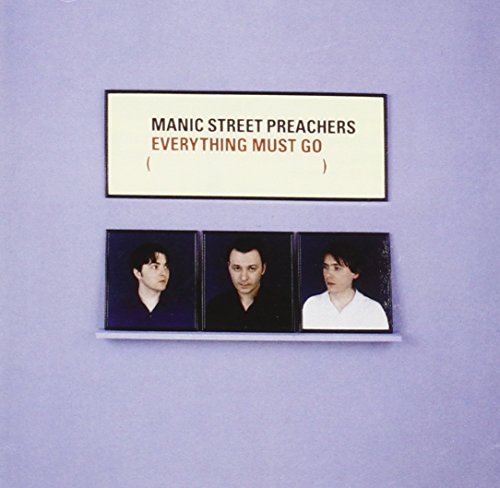Richey Edwards, lyricist and rhythm guitarist for the Manic Street Preachers, disappeared on the 1st of February, 1995. A year and a bit later, the remaining Manics released Everything Must Go, a huge album that found the group abandoning the gristly, confrontational sound of their previous record and making a move towards swooping strings and big, anthemic choruses. The Holy Bible is still the critics’ choice, but Everything Must Go was arguably the band’s first real step towards the fame, success, and Welsh national treasure status they now enjoy.
Understandably, Everything Must Go is often portrayed as the beginning of Manics Mk II; their first album as a trio, with a markedly more radio-friendly sound and Nicky Wire taking on more lyrical responsibility than ever before. It’s the album that gave the world ‘A Design for Life’, which has pretty much become the MSP’s signature song (not to mention their go-to set closer). This second incarnation of the band even found success in the singles chart, reaching the #1 spot with ‘If You Tolerate This Your Children Will Be Next’ from 1998’s This is My Truth Tell Me Yours.
Who would have guessed that the band who recorded The Intense Humming of Evil would one day have a #1 single?
But here’s the thing. The way I see it, ‘Everything Must Go’ looks every inch the swansong, an album that the band intended to be their last. Until ‘Journal for Plague Lovers’ arrived to dig up the past in 2009, EMG was the last Manics album to feature any lyrics by Richey Edwards, and I wonder if the band initially meant to release those last few songs and then call it a day.
The album title is very significant to this theory. ‘Everything Must Go’ is the sort of phrase you’d expect to see in the window of a shop that will soon be closing down.
Of course, if the Manics were planning to shut up shop after Everything Must Go, the album’s critical and commercial success may well have been the factor that persuaded them to change their minds. Had they split at that point, they’d not only have been quitting at the height of their powers but also at a time when Nicky Wire had just proved himself more than capable of handling the writing duties. Only three of EMG‘s twelve tracks were authored by Richey and Richey alone. They were:
- Kevin Carter
- Small Black Flowers That Grow in the Sky
- Removables
Another two songs – ‘Elvis Impersonator: Blackpool Pier’ and ‘The Girl Who Wanted to Be God’ – credit both Edwards and Wire as lyricists. This means that Nicky Wire wrote more than half of this album’s lyrics on his own, and almost without exception, his songs were the big hits. Kevin Carter was the only song written by Edwards to be released as a single, and it didn’t crack the UK Top 5 like A Design for Life and the title track did.
So by this point, it’s becoming clear that the Manics can function perfectly well without their troubled lyricist/rhythm guitarist. Factor in the glowing reviews (Vox magazine’s write-up noted that “professionally, at least, the Manic Street Preachers don’t miss Richey,”) and a triumphant live tour (which spawned the equally triumphant concert movie, Everything Live) and suddenly, Everything Must Go seems less like an ending and more like a rebirth. Would you have quit after all of that?
Still, I wonder what the world would make of the Manic Street Preachers if they’d stopped after ‘Everything Must Go’. I should mention that I’m only acquainted with two of the LPs that followed – ‘This is My Truth…’ and ‘Lifeblood’ – so I can’t really comment on the quality of their recent output. But I think that, if they had left it at four albums, they could have been one of those really big cult bands, a colossal, iconic band whose T-shirts people wear without ever listening to a note of their music.
They could, basically, have been this generation’s Joy Division. James, Nicky and Sean could even have done a New Order, reforming under a different name and carrying on from there whilst leaving the tragic brilliance of the Manics untouched.





